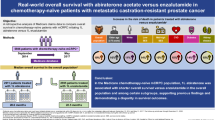Summary
Objective
To analyze drug adherence, overall survival (OS) and hospitalization rates of patients with castration-resistant prostate cancer (CRPC) treated with arbiraterone acetate (AA), enzalutamide (ENZ) and their sequence in a real-life setting.
Methods
The database of the largest public insurance company in Austria was analyzed. All CRPC patients with at least one prescription of AA and/or ENZ between September 2013 and August 2016 in the pre-chemotherapy and post-chemotherapy setting were extracted and matched to the Austrian death and hospital admission statistics. Drug adherence was estimated by the medication possession ratio (MPR).
Results
Data of 457 patients (mean age: 74.4 ± 8.5 years) were analyzed. The mean MPR was 90% for AA, 85% for ENZ and 88% for the sequence therapy cohort. The median overall survival (OS) of the entire cohort was 21 months: 15 months for AA, 24 months for ENZ, 26 months for the sequence group, and 10 months for the sequence group after switching. In the post-chemotherapy setting, the median OS was 14 months in AA treatment (mean: 15.8 ± 0.9 months), 19 months in the ENZ treatment (mean: 17.2 ± 1.4 months) and 25 months in the sequence group (mean: 22.7 ± 0.8 months). Median OS in the pre-chemotherapy setting was 25 months (mean: 21.5 ± 1.1 months), 18 months in AA treatment group (mean: 18.9 ± 1.5 months) and 17 months in ENZ treatment group (mean: 18.2 ± 1.9 months). Only 43 (9.4%) patients were not hospitalized during the course of the study. On average patients spent 13% of their remaining life span in hospital care (median 8%, range: 1–34%).
Conclusion
This Austrian prescription database allows some insights into the outcome of CRPC patients treated with AA and ENZ and their sequence in a real-life setting. Drug adherence was satisfactory, OS was shorter for AA and ENZ as compared to the pivotal phase III trials.




Similar content being viewed by others
References
Heidenreich A, Bastian PJ, Bellmunt J, et al. EAU guidelines on prostate cancer. Part II: Treatment of advanced, relapsing, and castration-resistant prostate cancer. Eur Urol. 2014;65(2):467–79.
Scher HI, Fizazi K, Saad F, et al. Increased survival with enzalutamide in prostate cancer after chemotherapy. N Engl J Med. 2012;367(13):1187–97.
Ryan CJ, Smith MR, de Bono JS, et al. Abiraterone in metastatic prostate cancer without previous chemotherapy. N Engl J Med. 2013;368(2):138–48.
Fizazi K, Scher HI, Molina A, et al. Abiraterone acetate for treatment of metastatic castration-resistant prostate cancer: Final overall survival analysis of the COU-AA-301 randomised, double-blind, placebo-controlled phase 3 study. Lancet Oncol. 2012;13(10):983–92.
Beer TM, Armstrong AJ, Rathkopf DE, et al. Enzalutamide in metastatic prostate cancer before chemotherapy. N Engl J Med. 2014;371(5):424–33.
Poon DM, Chan K, Lee SH, et al. Abiraterone acetate in metastatic castration-resistant prostate cancer—the unanticipated real-world clinical experience. Bmc Urol. 2016;16:12.
Mohamad Al-Ali B, Kramer G, Madersbacher S, Berger I. Abiraterone for castration-resistant prostate cancer: adherence, survival and hospitalization: analysis of a medical claims database. Wien Klin Wochenschr. 2017;129(11–12):380–4.
Sabaté E. Adherence to Long-Term Therapies: Evidence for Action. Geneva: World Health Organization; 2003. p. 673–7.
Smith AD, Olson C, Lyons B, Tran D, Blackburn DF. Adherence to abiraterone among the first 86 recipients after release in Saskatchewan. Curr Oncol. 2015;22(1):64–7.
Lafeuille MH, Grittner AM, Lefebvre P, et al. Adherence patterns for abiraterone acetate and concomitant prednisone use in patients with prostate cancer. J Manag Care Spec Pharm. 2014;20(5):477–84.
Smith MR, Rathkopf DE, Mulders PF, et al. Efficacy and safety of Abiraterone acetate in elderly (75 years or older) chemotherapy naive patients with metastatic castration resistant prostate cancer. J Urol. 2015;194(5):1277–84.
Partridge AH, LaFountain A, Mayer E, et al. Adherence to initial adjuvant anastrozole therapy among women with early-stage breast cancer. J Clin Oncol. 2008;26(4):556–62.
Owusu C, Buist DS, Field TS, et al. Predictors of tamoxifen discontinuation among older women with estrogen receptor-positive breast cancer. J Clin Oncol. 2008;26(4):549–55.
Grundmark B, Garmo H, Zethelius B, et al. Anti-androgen prescribing patterns, patient treatment adherence and influencing factors; results from the nationwide PCBaSe Sweden. Eur J Clin Pharmacol. 2012;68(12):1619–30.
Balkrishnan R. Predictors of medication adherence in the elderly. Clin Ther. 1998;20(4):764–71.
Matsubara N, Uemura H, Satoh T, et al. A phase 2 trial of abiraterone acetate in Japanese men with metastatic castration-resistant prostate cancer and without prior chemotherapy (JPN-201 study). Jpn J Clin Oncol. 2014;44(12):1216–26.
Leibowitz-Amit R, Templeton AJ, Omlin A, et al. Clinical variables associated with PSA response to abiraterone acetate in patients with metastatic castration-resistant prostate cancer. Ann Oncol. 2014;25(3):657–62.
Kluetz PG, Ning YM, Maher VE, et al. Abiraterone acetate in combination with prednisone for the treatment of patients with metastatic castration-resistant prostate cancer: U.S. Food and Drug Administration drug approval summary. Clin Cancer Res. 2013;19(24):6650–6.
Gupta E, Guthrie T, Tan W. Changing paradigms in management of metastatic Castration Resistant Prostate Cancer (mCRPC). Bmc Urol. 2014;14:55.
Goodman OB Jr., Flaig TW, Molina A, et al. Exploratory analysis of the visceral disease subgroup in a phase III study of abiraterone acetate in metastatic castration-resistant prostate cancer. Prostate Cancer Prostatic Dis. 2014;17(1):34–9.
de Bono JS, Logothetis CJ, Molina A, et al. Abiraterone and increased survival in metastatic prostate cancer. N Engl J Med. 2011;364(21):1995–2005.
Author information
Authors and Affiliations
Corresponding author
Ethics declarations
Conflict of interest
B.M. Al-Ali, K. Eredics, S. Madersbacher, and I. Schauer declare that they have no competing interests.
Rights and permissions
About this article
Cite this article
Al-Ali, B.M., Eredics, K., Madersbacher, S. et al. Abiraterone acetate, enzalutamide and their sequence for castration-resistant prostate cancer. Wien Klin Wochenschr 130, 659–664 (2018). https://doi.org/10.1007/s00508-018-1394-0
Received:
Accepted:
Published:
Issue Date:
DOI: https://doi.org/10.1007/s00508-018-1394-0




